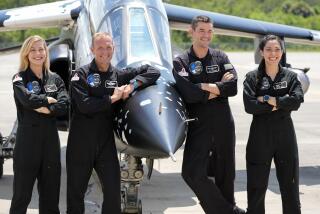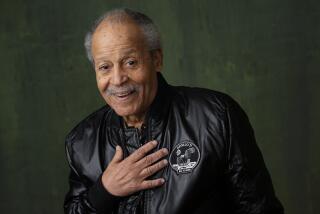Shuttle Captain Places Safety Over Time
- Share via
HOUSTON — The astronaut named to lead the United States back into space said Thursday that it will be very difficult to meet the target date of Feb. 18, 1988, for returning the space shuttle to duty for the first time since the Challenger disaster.
Navy Capt. Frederick H. Hauck and his four-man crew indicated at a press conference here that they intend to be more assertive than ever before on safety issues. Hauck said that if at any time schedule pressures generate bad decisions, it will be time to change the schedule.
Meanwhile, the National Research Council, which is evaluating the redesigning of the shuttle’s solid rocket boosters, criticized NASA’s contingency plans for dealing with problems surfacing in the testing of the boosters.
In a letter to NASA Administrator James C. Fletcher, an NRC panel said the potential for problems with the joint between the rocket casing and the nozzle, and with the nozzle itself, now exceeds the risk of leaks from the joints between the segments--the problem on the Challenger. NASA has no alternative to the current design in those areas, the letter said.
NASA Acknowledgement
NASA said it would study the NRC recommendations. Morton Thiokol, maker of the booster, refused to comment until it had seen the letter.
The crewmen did not take issue with a conclusion reached earlier this week by another oversight panel of the National Research Council--that there may not be enough time to complete all of the planned safety changes in time for a Feb. 18 launching.
“It’s going to be very difficult to make the Feb. 18 launch date,” Hauck said, but he added that “as long as it is possible, we might as well go for it.”
Three days after they were selected to fly the shuttle Discovery, Hauck and his crew pledged to carry on from where the Challenger’s crew of seven left off: “The spirit of the crew of Challenger,” he said, “is with us.”
After almost a year of investigation and re-grouping at the space agency, Hauck said that he begins training for the flight “very encouraged at the prospect of this nation regaining its leadership in manned space flight.”
At the same time, he warned that a repetition of the Challenger episode might kill the United States manned space flight program.
‘There Is Risk’
“Let’s be very clear. There is risk in flying in space--there should be no doubt about that. There will never be a space flight that does not have risk associated with it,” he said.
Hauck, 45, has flown in space twice. He will lead the most experienced crew in the history of the shuttle program.
Discovery’s pilot will be Air Force Col. Richard O. Covey, who piloted a spectacular 1985 flight on which astronauts repaired a communications satellite in orbit.
The three mission specialists--Marine Lt. Col. David C. Hilmers and civilian astronauts George D. Nelson and John M. Lounge--have all been aboard shuttle missions. Hilmers was a crew member on the first secret military mission of the shuttle Atlantis. Nelson and Lounge have both taken part in satellite repair missions, and Nelson was a crew member aboard the shuttle Columbia, which landed just 10 days before the Challenger tragedy.
The chief objective of the four-day journey, aside from returning the space plane to service with redesigned solid rocket boosters, will be to launch a single tracking and data-relay satellite.
Crew Visits Planned
Crew training is to begin in earnest next month. Hauck said that he and the other four astronauts will pay calls to NASA and contractor facilities early in the year, to boost morale and show the workers that the shuttle program is moving again.
It is still not clear whether Discovery will be outfitted with an in-flight escape system for the crew. Although they emphasized that they would like to have an ejection system that would give them a chance to escape under limited circumstances, Hauck and his crew said Thursday that they would be willing to fly even if the bail-out system is not available.
All of the Discovery crewmen said that their families understood their excitement at being chosen for the crucial flight, but Lounge said he expects them to view the launch much differently than earlier blast-offs:
“The next time, it won’t be quite so festive until we are safely in orbit,” he said.
More to Read
Sign up for Essential California
The most important California stories and recommendations in your inbox every morning.
You may occasionally receive promotional content from the Los Angeles Times.













